Threshold House
When it was announced that Coil would play their first live show inNorth America on August 18, 2001, I was shocked by what seemed like anincredible series of synchronicities. I had long considered Coil to beone of my favorite bands, but I thought there would be little or nochance of ever seeing them play live. Though they had recently begunplaying select concerts at some classy venues and festivals in Europe,they just seemed far too shadowy, eccentric and English to ever graceAmerican shores. Strangely, the day announced for the concert was notonly my birthday, butmy 23rd birthday, a number commonly involved with synchronicity, and anumber often mythologized by Coil themselves. Also, before hearing theannouncement, I had already planned a trip to New York City tocelebrate my birthday. It seemed as if mysterious forces had aligned into make certain that I would not miss this Coil performance. However, Idid not have very high expectations for the concert itself. Sure, Coilwere mind-bending and transcendent on record, but how could theircomplex, studio-hermetic sound possibly translate into a meaningfullive show? Coil's liveperformance is a revelation; a powerful, dramatic explosion of dynamicenergy, every bit as impressive as their recorded output, but somehoweven more potent and overwhelming. The absolutely massive soundachieved by Sleazy's digital programming, Thighpaulsandra's soaringsynthesizers and Jhon Balance's possessed outbursts clearly neededproper documenting on record. Recently, Coil inaugurated abackwards-unfolding series of four live CDs, each documenting adifferent "age" of their constantly evolving live show. To thosewilling to shell out nearly $200, Threshold House also offered alimited box set of all four discs, together with two extra CD-Rs and"art objects" allegedly "loaded with magickal intent".
 LIVE FOUR
LIVE FOUR
Thisdocuments the Coil concerts that took place throughout Europe in thefall of 2002. As such, it is the most eclectic of the four discs,containing four songs that have never been on an album, and severalother songs rarely performed in their live shows. "I Am Angie Bowie(Sine Waves)" opens the disc, with its mind-scraping oscillations andBalance's absurd shouts of "I am Angie Bowie! No!" For the next song,Coil resurrect the long-discarded track "Last Rites of Spring" fromGold is the Metal, and expand it into a 10-minute excursion payinghomage to the author of Naked Lunch and Electronic Revolution: "WilliamS. Burroughs is hallucinating is space," intones a confident Balance."Are You Shivering?" and the omnipresent "Amethyst Deceivers" are moreor less faithfully reproduced here. John Balance's playfulaudience-baiting is in rare form on "The Universe is a Haunted House"as he darkly intones "I'm not here..." out of the left stereo channel,then answers "I am there..." from the right. The song unexpectedlymutates into a shattering reprise of Coil's acid rave classic"Windowpane." The mix is just right on this disc, with vocals and musicwell-balanced and reproduced crisply for home listening. "Bang Bang" isthe rare instance of Coil covering someone else's song, in this case aCher (!) ballad penned by the late Sonny Bono. Balance's delivery issolemn and haunting, turning the song into an icy murder ballad,although I can't help but be amused by Coil's outrageously campy choiceto cover this song. The disc ends with the scary bombast of "AnUnearthly Red," a noisy, industrial invocation of war: "I didn't wantto do it!" screams Balance, "God told me to do it!" A computer-animatedflight simulation ending with a harrowing crash into the World TradeCenter accompanied this song in concert.
samples:
 LIVE THREE
LIVE THREE
This documents a Spring 2002 show performed inBologna. It was an interesting period for Coil performances, asThighpaulsandra temporarily left the line-up to tour withSpiritualized. To make up for his noticeable absence, Peter and Johnenlisted Mike York and Cliff Stapleton to fill in with hurdy-gurdy andBreton pipes. This new, exotic instrumentation adds an unstable,organic element to the performance that works well with the setlistchosen for these shows. The disc opens with the ritualized workout of"Anarcadia: All Horned Animals." If you've heard The Remote ViewerEP, these ethnic-inflected drones will sound very familiar, notentirely dissimilar from Taj Mahal Travellers or The Magic Carpathiansat their most psychedelic. "Amethyst Deceivers" is here again, one offour slightly variant versions available in the box set. The classictrack "Slur" from Horse Rotorvator is given a faithful rendition, butBalance's voice is not quite equal to the job of singing this one, andMarc Almond's backing vocals are sorely missed. Balance dedicates "ACold Cell" to all the prisoners of the world, as well as those "inprisons of their own making." It's always been a haunting song, and thelive version enhances its lonely, melancholic atmosphere. Track six isan accomplished recreation of "Paranoid Inlay" from Musick To Play in the Dark 2,even though the tracklisting on the back of the digipack omits itcompletely. "Sick Mirrors (Version)" is a meditation on the concept ofremote viewing utilizing dense Middle Eastern melodies. The songseamlessly segues into a frighteningly intense version of "A.Y.O.R.,"the second of three songs in this set that may have been destined forCoil's long-promised-but-never-delivered Nothing Records album, nowreferred to as The World Ended a Long Time Ago. "Backwards"ends the set, a joyous psychosexual EBM bacchanalia, with Balanceuttering some of his most transgressive lyrics: "Fuck me inreverse/Normal is perverse/Everything's backwards." This disc would beperfect were it not for a rather nagging problem with the mixing, whichseems to favor Balance's vocals and pushes much of the music into amuddy, nebulous background. Even with the technical difficulties, Live Three is an essential chronicle of one of Coil's most inspired shows.
samples:
 LIVE TWO
LIVE TWO
Coil's Moscow performance in the Fall of 2001is documented here, soon after their brief stateside visit. Like theNYC show, the Moscow performance went under the banner "ConstantShallowness Leads to Evil," a tight, energetic performance highlightingCoil's most confrontational material. This is my personal favorite ofthe four periods of Coil's live shows, simply because Coil seemed atthis stage to be perfectly in control of their audience, skillfullyheightening tension and confounding expectations, all the whilesubliminally projecting their bizarre brand of personal empowermentpropaganda onto the unwitting observers. This Moscow performance seemsto be the absolute zenith of the "Constant Shallowness" show, which iswhy the bad mix on tracks like "What Kind of Animal Are You?" is verydisappointing indeed. The officially sanctioned bootleg CD-R recordingof the NYC show actually boasts superior audio, which is surprisingconsidering Coil's usually scrupulous attention to their productionfidelity. Still, this performance is very impressive, especially thepitch-perfect rendition of Horse Rotorvator's "Blood From the Air." Thefinal, apocalyptic blowout of "Constant Shallowness Leads toEvil" begins with Balance satirically answering some vicious rumorsprinted in a Russian publication: "We've heard that some of you mayhave read that we eat human flesh. However, we only do this onreligious holidays." Coil then launch into a lengthy noise assaultspecifically formulated to exorcise you of demons and brainwash you ofall your previous learning,leaving you vulnerable for Coil's subliminal psychobabble. "God pleasefuck my mind for good!" screams a wrecked Balance, stealing a line fromCaptain Beefheart's "Making Love to a Vampire With a Monkey on MyKnee." If you manage to make it to the end of this exhausting set withyour sanity intact, you may truly grasp Coil's final motto "Persistenceis All."
samples:
 LIVE ONE
LIVE ONE
The last in the live series is a 2-CD set beautifully packaged in afoldout digipack. The two discs document the first two Coilperformances of the new millennium, focusing on their Time Machinesmaterial. It must have been terribly exciting for the audience at theRoyal Festival Hall in April of 2000 to hear the opening tones of"Everything Keeps Dissolving," this being Coil's first true liveconcert other than some sallow, abortive attempts made in the early80's. Coil no doubt practiced for months, as they show no signs ofunease in unveiling their polished live presence. Disc one originallysaw limited release as Time Machines Live only available with mail order copies of Musick to Play in the Dark 2.It's swell for this material to be widely available, as it is truly agreat concert and a flawless recording. At this early stage in Coil'sperformances, John Balance had not yet adopted the dancing, screaming,extroverted lunatic personality he was to unveil in later shows.Therefore, the three tracks that make up the London show contain nolive singing, just a series of enraptured electronic oscillations thattwist around the brain, wiping out all thought but an extreme sense ofdislocation and confusion. "Queens of the Circulating Library" utilizessamples of Thighpaulsandra's opera-singing mum Dorothy Lewis, togetherwith digital arpeggiations and sexy purrs from a wounded synthesizer."Chasms" flirts close to Tangerine Dream territory, a swirlingcirculation of warm synthesizer tones that unfold like a Russianscience fiction film. Disc two comprises Coil's terrific performance atBarcelona's Sonar festival in June of 2000. It repeats the same songsfrom disc one, but adds three new songs to the setlist, including thefourth and final permutation of "Amethyst Deceivers." Bill Breeze playsviola throughout the entrancing set, adding some beautifulneo-classical flourishes. "TheUniverse is a Haunted House," a line taken directly from Burroughs' Naked Lunch, is present in a much more nascent version than the one heard on Live Four.Unfortunately, this disc suffers from two problems. First, the audiosource used for this release was not made from the soundboard, but israther a recording by a member of the audience. While pains have beentaken to clean up the sound, the audio does suffer from the technicalproblems inherent in bootleg recordings, including annoying audiencechatter and trebly distortions. Second, although the digipack lists sixtracks, the CD only contains five tracks, the last two apparentlyhaving been accidentally merged. Still, this is a rather impressivebootleg recording, and these problems can easily be forgiven and theconcert still enjoyed. We hear Jhon Balance step to the front for thefirst time, delivering a series of blood-curdling screams on "Elves,"once again making a play for the title of the most warped vocalist inmusic today.
samples:
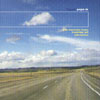 The third single Dave Pajo's series of audio tour diaries showcases hisinterpretation of a couple of covers and one original track; recordedin Bloomington and Chicago while on tour with his current day job,Zwan. Pajo's vocals and country-influenced guitar pickin' on thetraditional "Wild Mountain Thyme" convey the tune's original spirit.Background vocals and strings from collaborators Molly Kien and MaggiePolk make this track all the more authentic. My current favoritehurtin' tune would be Pajo's cover of Little Feat's "Truckstop Girl"with its jangly capo'ed acoustic guitar that, while beautifully played,brings a sadness along with vocals that sing of the end of a loveaffair that results in tragedy. Although the overdubbed electricguitars that take the tune out are fairly simple, their tone and timingare very powerful in context. The original "Who Knows" has Pajohandling the duties of drummer and bass player along with hismulti-tracked vocals and guitars on a relaxed tune whose interestingcountry-tinged chord changes and lyrics feel very comfortable. As thesesingles are being released, I've been wondering if any of the materialmight surface on the next full-length Papa M release. As I'd mentionedin a prior review, there's a certain charm to hearing these tunesstripped down as they are. If this is what Mr. Pajo has been up towhile he's busy on the road, the results from being in a more relaxedstudio environment should be all the more exciting.
The third single Dave Pajo's series of audio tour diaries showcases hisinterpretation of a couple of covers and one original track; recordedin Bloomington and Chicago while on tour with his current day job,Zwan. Pajo's vocals and country-influenced guitar pickin' on thetraditional "Wild Mountain Thyme" convey the tune's original spirit.Background vocals and strings from collaborators Molly Kien and MaggiePolk make this track all the more authentic. My current favoritehurtin' tune would be Pajo's cover of Little Feat's "Truckstop Girl"with its jangly capo'ed acoustic guitar that, while beautifully played,brings a sadness along with vocals that sing of the end of a loveaffair that results in tragedy. Although the overdubbed electricguitars that take the tune out are fairly simple, their tone and timingare very powerful in context. The original "Who Knows" has Pajohandling the duties of drummer and bass player along with hismulti-tracked vocals and guitars on a relaxed tune whose interestingcountry-tinged chord changes and lyrics feel very comfortable. As thesesingles are being released, I've been wondering if any of the materialmight surface on the next full-length Papa M release. As I'd mentionedin a prior review, there's a certain charm to hearing these tunesstripped down as they are. If this is what Mr. Pajo has been up towhile he's busy on the road, the results from being in a more relaxedstudio environment should be all the more exciting.


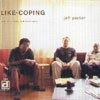 For the first release under his own name, guitarist Jeff Parker(Tortoise/Isotope 217) presents a disc of fairly straight-ahead jazzcompositions in a trio setting featuring longtime associates and fellowChicago Undergrounders Chris Lopes on upright bass and Chad Taylor ondrums. Although Parker's playing is the main focal point with thisformat, the group's well-crafted compositions and support convey anhonesty of a collective recording that just happens to feature theguitar, moreso than a soloist with a backing group. A few free-jazzfreakouts are also included for good measure. Taylor's heartfeltcomposition, "Miriam," opens the disc as a brushed waltz of warm chordchanges that briefly sneak into double time throughout subtle guitarsoloing. The disc's uptempo title track, penned by Lopes, features somecool vamping sections at the chorus' turnaround that solidify thestructure and give a strong reference point during each player's solo.Named for his daughter, Parker's "Days Fly By (with Ruby)" moves froman oom-pah styled unison guitar and bass intro over Taylor's busy brushsoloing to finger snapping swing for some tasteful playing on anoverall great composition. The only hint of structure on thefree-spirited "Omega Sci Fi" are the blasts of walking bass lines thatplay against bombastic drums, splintered cymbals and scraping guitarfor four minutes of busy instrumental dialogue that chases down thenext line to be stated. Fans of Parker's work that have come to expecta certain style of playing and tone with his above mentioned maingroups, along with other projects such as Toe 2000 and Tricolor shouldbe pleasantly surprised with this album. A more traditional style ofwriting and playing that hadn't been as evident before shinesthroughout the recording and shows the vast talent of a great player.
For the first release under his own name, guitarist Jeff Parker(Tortoise/Isotope 217) presents a disc of fairly straight-ahead jazzcompositions in a trio setting featuring longtime associates and fellowChicago Undergrounders Chris Lopes on upright bass and Chad Taylor ondrums. Although Parker's playing is the main focal point with thisformat, the group's well-crafted compositions and support convey anhonesty of a collective recording that just happens to feature theguitar, moreso than a soloist with a backing group. A few free-jazzfreakouts are also included for good measure. Taylor's heartfeltcomposition, "Miriam," opens the disc as a brushed waltz of warm chordchanges that briefly sneak into double time throughout subtle guitarsoloing. The disc's uptempo title track, penned by Lopes, features somecool vamping sections at the chorus' turnaround that solidify thestructure and give a strong reference point during each player's solo.Named for his daughter, Parker's "Days Fly By (with Ruby)" moves froman oom-pah styled unison guitar and bass intro over Taylor's busy brushsoloing to finger snapping swing for some tasteful playing on anoverall great composition. The only hint of structure on thefree-spirited "Omega Sci Fi" are the blasts of walking bass lines thatplay against bombastic drums, splintered cymbals and scraping guitarfor four minutes of busy instrumental dialogue that chases down thenext line to be stated. Fans of Parker's work that have come to expecta certain style of playing and tone with his above mentioned maingroups, along with other projects such as Toe 2000 and Tricolor shouldbe pleasantly surprised with this album. A more traditional style ofwriting and playing that hadn't been as evident before shinesthroughout the recording and shows the vast talent of a great player.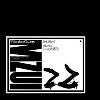 Back before the Internet and World Wide Web allowed music junkies to connect with others and trade secrets, fans of bands in areas of the world far outside the band's nucleus had to rely on sources like magazines and books for the best information they could get on a group. Despite being a project from former Wire members, the experimental music contained didn't make it a title which warranted an in-print status and copies worldwide were rather scarce. As a young Wire fan, it had been on my personal wish list for years. When I finally discovered it in 1998 as a used record for $30 my heart jumped. I finally found it!
Back before the Internet and World Wide Web allowed music junkies to connect with others and trade secrets, fans of bands in areas of the world far outside the band's nucleus had to rely on sources like magazines and books for the best information they could get on a group. Despite being a project from former Wire members, the experimental music contained didn't make it a title which warranted an in-print status and copies worldwide were rather scarce. As a young Wire fan, it had been on my personal wish list for years. When I finally discovered it in 1998 as a used record for $30 my heart jumped. I finally found it!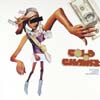 It's not surprising that the first full-length Gold Chains release isreceiving mixed reviews. Everybody's only used to hearing a GC productin shorter increments—and the reason why that works so perfectly isthat it's complimentary to the unique GC style. Topher LaFata, whobasically -is- Gold Chains is one mad talented motherfucker. His rap isdensely packed, rarely ever pausing to let the music to exist on itsown, while the music is so intricate and involved, changing stylesoften from bar to bar. By the second track he's gone from four on thefloor techno to swinging post-industrial, and nerdy glitch pop all in amatter of minutes. The swapping of styles continues for the rest of therelease, from parodies of big buck rap to jazzy interludes. Couple thiswith rare occurances of lyrical repetition or a "chorus," and tuning into the music demands complete and undivided attention. Only untilrepeated listens are instruments like live drums, piano, and guitarseven audible, since the subject matter of the rap is such an involvedfantasy world that it's hard to pay attention to everything else that'sgoing on. Thankfully lyrics were included this time around. Reading thelyrics without the music is also a fun exercise as they make greatjournal entries or stream of consciousness writing on their own. Topherloves to play with language, with a number of themes which seem toresurface. Themes about San Francisco, society, sex, drugs, money, and"warpping that Cali cooch in Prada" are amusing but crashing 11 songsof that in a row makes this album work best as a record to be paused inthe middle while the listener's got to get up off their ass and go flipit. In a bizarre way, it all makes sense that Topher is an oldindustrial fan, a former punk bass player, and allegedly an intensecomputer programmer. Gold Chains is almost like the prog-rock of modernelectronic laptop rap, as the music is so dense, academicallyflamboyant, technically nerdy, but superbly addictive after its hookshave sunk in. Some people claim that with an expensive video and theright promotion, this guy could be huge, but I think at this point hismusic is far more involved than the general public can handle. I lookforward to the "techno" album LaFata claims to be working on as even anold GC tune like "Burn Babylon" has the fabulous powers of sexy killerhooks. The question remains: if world domination is in the dreams ofGC, is he willing to dumb his music down for the masses? I sure as hellhope not.
It's not surprising that the first full-length Gold Chains release isreceiving mixed reviews. Everybody's only used to hearing a GC productin shorter increments—and the reason why that works so perfectly isthat it's complimentary to the unique GC style. Topher LaFata, whobasically -is- Gold Chains is one mad talented motherfucker. His rap isdensely packed, rarely ever pausing to let the music to exist on itsown, while the music is so intricate and involved, changing stylesoften from bar to bar. By the second track he's gone from four on thefloor techno to swinging post-industrial, and nerdy glitch pop all in amatter of minutes. The swapping of styles continues for the rest of therelease, from parodies of big buck rap to jazzy interludes. Couple thiswith rare occurances of lyrical repetition or a "chorus," and tuning into the music demands complete and undivided attention. Only untilrepeated listens are instruments like live drums, piano, and guitarseven audible, since the subject matter of the rap is such an involvedfantasy world that it's hard to pay attention to everything else that'sgoing on. Thankfully lyrics were included this time around. Reading thelyrics without the music is also a fun exercise as they make greatjournal entries or stream of consciousness writing on their own. Topherloves to play with language, with a number of themes which seem toresurface. Themes about San Francisco, society, sex, drugs, money, and"warpping that Cali cooch in Prada" are amusing but crashing 11 songsof that in a row makes this album work best as a record to be paused inthe middle while the listener's got to get up off their ass and go flipit. In a bizarre way, it all makes sense that Topher is an oldindustrial fan, a former punk bass player, and allegedly an intensecomputer programmer. Gold Chains is almost like the prog-rock of modernelectronic laptop rap, as the music is so dense, academicallyflamboyant, technically nerdy, but superbly addictive after its hookshave sunk in. Some people claim that with an expensive video and theright promotion, this guy could be huge, but I think at this point hismusic is far more involved than the general public can handle. I lookforward to the "techno" album LaFata claims to be working on as even anold GC tune like "Burn Babylon" has the fabulous powers of sexy killerhooks. The question remains: if world domination is in the dreams ofGC, is he willing to dumb his music down for the masses? I sure as hellhope not.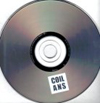
 MEGALITHOMANIA!
MEGALITHOMANIA! When it was announced that Coil would play their first live show inNorth America on August 18, 2001, I was shocked by what seemed like anincredible series of synchronicities. I had long considered Coil to beone of my favorite bands, but I thought there would be little or nochance of ever seeing them play live. Though they had recently begunplaying select concerts at some classy venues and festivals in Europe,they just seemed far too shadowy, eccentric and English to ever graceAmerican shores. Strangely, the day announced for the concert was notonly my birthday, butmy 23rd birthday, a number commonly involved with synchronicity, and anumber often mythologized by Coil themselves. Also, before hearing theannouncement, I had already planned a trip to New York City tocelebrate my birthday. It seemed as if mysterious forces had aligned into make certain that I would not miss this Coil performance. However, Idid not have very high expectations for the concert itself. Sure, Coilwere mind-bending and transcendent on record, but how could theircomplex, studio-hermetic sound possibly translate into a meaningfullive show? Coil's liveperformance is a revelation; a powerful, dramatic explosion of dynamicenergy, every bit as impressive as their recorded output, but somehoweven more potent and overwhelming. The absolutely massive soundachieved by Sleazy's digital programming, Thighpaulsandra's soaringsynthesizers and Jhon Balance's possessed outbursts clearly neededproper documenting on record. Recently, Coil inaugurated abackwards-unfolding series of four live CDs, each documenting adifferent "age" of their constantly evolving live show. To thosewilling to shell out nearly $200, Threshold House also offered alimited box set of all four discs, together with two extra CD-Rs and"art objects" allegedly "loaded with magickal intent".
When it was announced that Coil would play their first live show inNorth America on August 18, 2001, I was shocked by what seemed like anincredible series of synchronicities. I had long considered Coil to beone of my favorite bands, but I thought there would be little or nochance of ever seeing them play live. Though they had recently begunplaying select concerts at some classy venues and festivals in Europe,they just seemed far too shadowy, eccentric and English to ever graceAmerican shores. Strangely, the day announced for the concert was notonly my birthday, butmy 23rd birthday, a number commonly involved with synchronicity, and anumber often mythologized by Coil themselves. Also, before hearing theannouncement, I had already planned a trip to New York City tocelebrate my birthday. It seemed as if mysterious forces had aligned into make certain that I would not miss this Coil performance. However, Idid not have very high expectations for the concert itself. Sure, Coilwere mind-bending and transcendent on record, but how could theircomplex, studio-hermetic sound possibly translate into a meaningfullive show? Coil's liveperformance is a revelation; a powerful, dramatic explosion of dynamicenergy, every bit as impressive as their recorded output, but somehoweven more potent and overwhelming. The absolutely massive soundachieved by Sleazy's digital programming, Thighpaulsandra's soaringsynthesizers and Jhon Balance's possessed outbursts clearly neededproper documenting on record. Recently, Coil inaugurated abackwards-unfolding series of four live CDs, each documenting adifferent "age" of their constantly evolving live show. To thosewilling to shell out nearly $200, Threshold House also offered alimited box set of all four discs, together with two extra CD-Rs and"art objects" allegedly "loaded with magickal intent". LIVE FOUR
LIVE FOUR LIVE THREE
LIVE THREE LIVE TWO
LIVE TWO LIVE ONE
LIVE ONE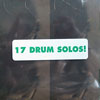 If "prog-esque overblown, overlong self-indulgent wankery" sounds like a bad thing or if comparison with Tales From Topographic Oceans carries un-cool implications then this CD may not be for you. I doubt that there remain many Brainwashed readers who still subscribe to the NME's Exclusion Principle, i.e. that to like The Fall you have to revile Yes, and it is to those thus enlightened readers that I'd recommend Just Drums.
If "prog-esque overblown, overlong self-indulgent wankery" sounds like a bad thing or if comparison with Tales From Topographic Oceans carries un-cool implications then this CD may not be for you. I doubt that there remain many Brainwashed readers who still subscribe to the NME's Exclusion Principle, i.e. that to like The Fall you have to revile Yes, and it is to those thus enlightened readers that I'd recommend Just Drums.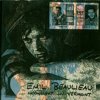 Forget every "rule" of noise, do away with any preconceptions concernedwith the genre, and prepare for something just a bit different. Thereare silences, sonic abberations, variations in pitch, timbre, andduration, and a wide palette of moans, groans, and explosions used allat once. Variety and intrigue is the name of the game on Moonlight In Vermontand Emil Beaulieau is chess master (if you will). Sure, there'spunishing, unrelenting, cascading, headache-inducing assaults to befound on this disc, but there's also dynamic elements. Most noise I'veheard ends up sounding like one mass of destruction hell-bent onchewing concrete. Beaulieau's noise is different because he is capableof using sonically opposite sounds together. It could still eatconcrete for breakfast, though. The first half is a nuclear melt-downaccompanied by random samples (like a flute), electric stabs of rhythm,and the sound of unholy wails. If this is what a moonlit Vermont soundslike, I'm staying the hell out unless I have a shotgun and a smallarmy. It's a truly scary summit that is reached before the fifth track(all of them are unnamed) acts as an oxygen tank and restores somesense of direction and balance. What sounds like a backwards guitarhums in the background whilst changing tones, punchy gasps of static,and roaring winds pour through the speakers. It makes getting submergedbeneath the final two tracks a bit easier. Beaulieau's recorded soundhas as much character as his live performances have but it's twistedand shaped in different ways. Sounds just don't start and stop; they'realive and full of nuance. The last I checked, Moonlight was only available on the tour but with some luck perhaps it'll show up at RRRecords, soon.
Forget every "rule" of noise, do away with any preconceptions concernedwith the genre, and prepare for something just a bit different. Thereare silences, sonic abberations, variations in pitch, timbre, andduration, and a wide palette of moans, groans, and explosions used allat once. Variety and intrigue is the name of the game on Moonlight In Vermontand Emil Beaulieau is chess master (if you will). Sure, there'spunishing, unrelenting, cascading, headache-inducing assaults to befound on this disc, but there's also dynamic elements. Most noise I'veheard ends up sounding like one mass of destruction hell-bent onchewing concrete. Beaulieau's noise is different because he is capableof using sonically opposite sounds together. It could still eatconcrete for breakfast, though. The first half is a nuclear melt-downaccompanied by random samples (like a flute), electric stabs of rhythm,and the sound of unholy wails. If this is what a moonlit Vermont soundslike, I'm staying the hell out unless I have a shotgun and a smallarmy. It's a truly scary summit that is reached before the fifth track(all of them are unnamed) acts as an oxygen tank and restores somesense of direction and balance. What sounds like a backwards guitarhums in the background whilst changing tones, punchy gasps of static,and roaring winds pour through the speakers. It makes getting submergedbeneath the final two tracks a bit easier. Beaulieau's recorded soundhas as much character as his live performances have but it's twistedand shaped in different ways. Sounds just don't start and stop; they'realive and full of nuance. The last I checked, Moonlight was only available on the tour but with some luck perhaps it'll show up at RRRecords, soon. 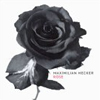 Think back to 2001 and try to remember Max Hecker's first album.Remember how it teetered dangerously on the borderline of campybrilliance and revolting sappiness? Unfortunately, for his secondfull-length album, Hecker has fallen over the line, completely onto theside of sappiness. Gone are the edgy guitar distortions, swirlingcalliope-esque melodies and brilliant acoustic guitar fingerpicking.What we're left with is a weak collection of soft-rock rejects withwimpy guitar solos, not even edgy enough to earn rotation in hotelelevators. Sure, Hecker's crybaby falsetto voice was never rugged tobegin with, but the music now is unchallenging and the words areoverrepetitious and almost completely brainless. On Infinite Love Songs,words like "Hide your cheeks with dirt / come and wear my shirt," werejust an example off the top of my head of the somewhat attractivelybizarre word choices, while hearing "Hold me now / heal my wounds," inthe song "I am Falling Now" here is a perfect example of a pitiful messof a man of whom I have absolutely no sympathy for. The closest thealbum gets to the glorious marriage of chaos and order is probably theblurry noise in "My Friends," but the noisy section is haphazardlysandwiched by a MOR film theme-ish piano and synth melody. "My Love ForYou Is Insane," however, is a completely new direction in garbage witha revolting generic drum 'n bass loop and more whiny lyrics. PerhapsI'm just a snotty, jaded critic, but hints, subtlety, and abstractsurrealism gain far more ground with me in a pop framework thanunchallenging, overtly simplistic narrative prose. I guess what itboils down to is that I'm more keen on Tim Buckley than ChristopherCross.
Think back to 2001 and try to remember Max Hecker's first album.Remember how it teetered dangerously on the borderline of campybrilliance and revolting sappiness? Unfortunately, for his secondfull-length album, Hecker has fallen over the line, completely onto theside of sappiness. Gone are the edgy guitar distortions, swirlingcalliope-esque melodies and brilliant acoustic guitar fingerpicking.What we're left with is a weak collection of soft-rock rejects withwimpy guitar solos, not even edgy enough to earn rotation in hotelelevators. Sure, Hecker's crybaby falsetto voice was never rugged tobegin with, but the music now is unchallenging and the words areoverrepetitious and almost completely brainless. On Infinite Love Songs,words like "Hide your cheeks with dirt / come and wear my shirt," werejust an example off the top of my head of the somewhat attractivelybizarre word choices, while hearing "Hold me now / heal my wounds," inthe song "I am Falling Now" here is a perfect example of a pitiful messof a man of whom I have absolutely no sympathy for. The closest thealbum gets to the glorious marriage of chaos and order is probably theblurry noise in "My Friends," but the noisy section is haphazardlysandwiched by a MOR film theme-ish piano and synth melody. "My Love ForYou Is Insane," however, is a completely new direction in garbage witha revolting generic drum 'n bass loop and more whiny lyrics. PerhapsI'm just a snotty, jaded critic, but hints, subtlety, and abstractsurrealism gain far more ground with me in a pop framework thanunchallenging, overtly simplistic narrative prose. I guess what itboils down to is that I'm more keen on Tim Buckley than ChristopherCross.
